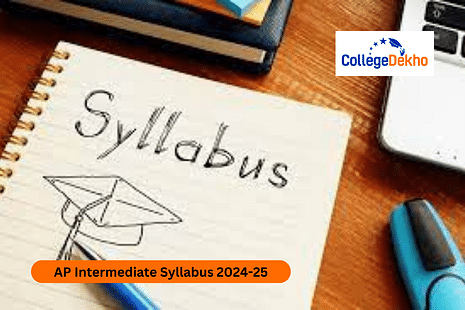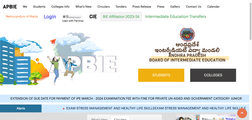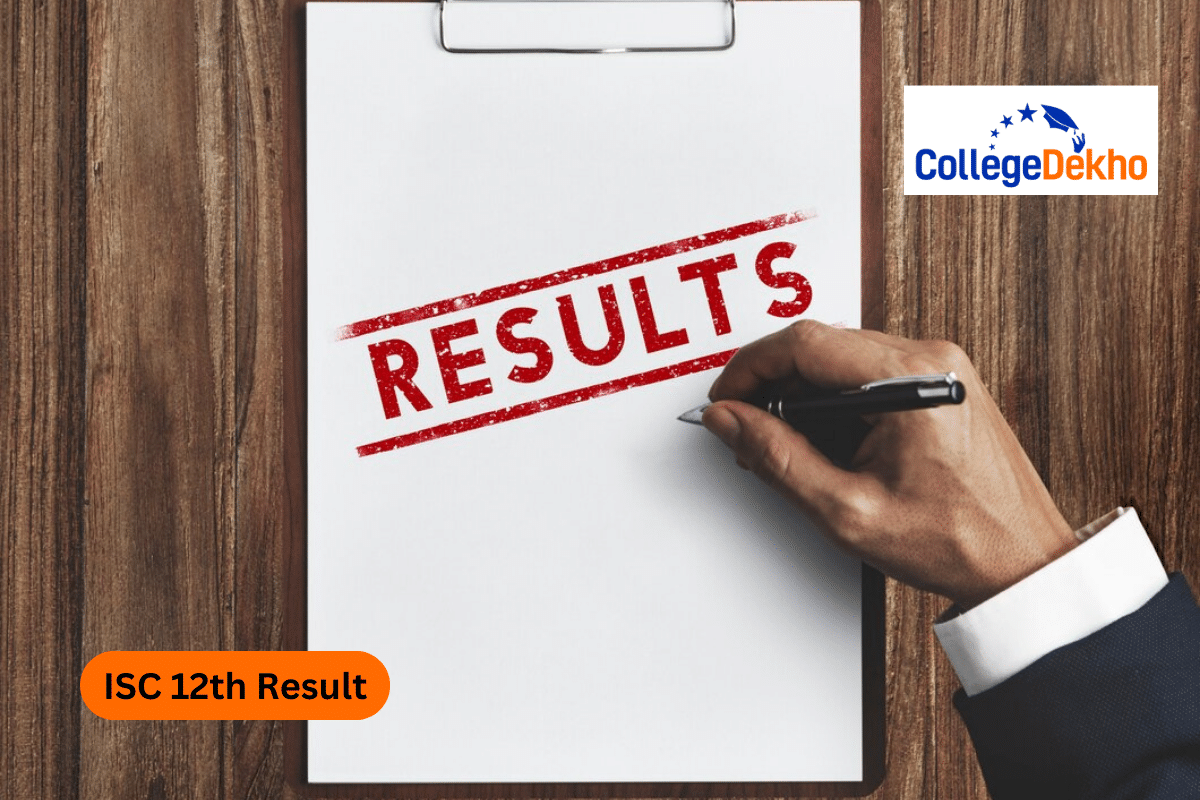AP Intermediate Syllabus 2024-25 PDFs will be released by the Board of Intermediate Education, Andhra Pradesh at bie.ap.gov.in. Students can find and download the subject-wise PDFs from here as well. Scroll down to check for all the details of AP 12th Syllabus 2024.
- Latest Updates
- AP Intermediate Syllabus 2024-25: Highlights
- AP Intermediate Syllabus 2024-25: Download Links
- AP Intermediate Syllabus 2024-25 for Mathematics
- AP Intermediate Syllabus 2024-25 for Languages
- AP Intermediate Syllabus 2024-25 for Part II Languages
- AP Intermediate Syllabus 2024-25 for Chemistry
- AP Intermediate Syllabus 2024-25 for Physics
- AP Intermediate Syllabus 2024-25 for Economics
- AP Intermediate Syllabus 2024-25 for Zoology
- AP Intermediate Syllabus 2024-25 for Botany
- AP Intermediate Syllabus 2024-25 for Psychology
- AP Intermediate Syllabus 2024-25 for Geography
- AP Intermediate Syllabus 2024-25 for Sociology
- AP Intermediate Syllabus 2024-25 for Marking Scheme
- Benefits of Knowing the AP Intermediate Syllabus 2024-25
- AP Intermediate Important Books 2025
- AP Intermediate Preparation Tips 2024-25
- Faqs


Never Miss an Exam Update
AP Intermediate Syllabus 2024-25: The Board of Intermediate Education, Andhra Pradesh will release the BIEAP 12th syllabus for the academic year 2024-25 on its official website at bie.ap.gov.in. The board will release the AP Intermediate Syllabus for 2nd year for the Arts, Commerce, and Science streams together in a common PDF. In the AP Intermediate Exam 2025 , a total of 5 subjects are compulsory for all stream students. These 5 compulsory subjects include First language, Second language, and 3 elective subjects. A total of 100 marks will be allocated for the language papers. Marks allotted for the theory examinations of Maths and Geography will be worth 75 marks. The theory exam for subjects such as Physics, Chemistry, Botany, and Zoology will carry 60 marks each.
For the practical-based subjects, the theory paper will carry 70 marks and the rest 30 marks will be for the practicals. Students must secure a minimum of 35% in each subject to clear the exams. The Andhra Pradesh Board will release the AP Inter 1st year syllabus 2024-25 along with the class 12th syllabus. AP Intermediate Hall Ticket 2025 for 1st and 2nd year exams will be released in February 2025.
Latest Updates
- 11th December 2024: AP Intermediate Time Table 2025 was released today. The AP Inter 1st year Exam 2025 will be held from March 1 to 19, 2025 and the AP Inter 2nd year Exam 2025 will be held from March 3 to 20, 2025.
AP Intermediate Syllabus 2024-25: Highlights
Given below are the important highlights related to AP Inter 2nd Year Syllabus 2025:
Name of the Board | Board of Intermediate Education Andhra Pradesh (BIEAP) |
|---|---|
Class | Intermediate / 1st Year & 2nd Year |
Groups | MPC, BIPC, CEC, HEC, etc. |
Subjects | Telugu, English, Botany, Urdu, Sanskrit, Mathematics, Physics, Chemistry |
Medium | Telugu Medium, English Medium, Urdu Medium |
Category | AP, Intermediate, Syllabus |
Academic Year | 2024-25 |
Official Website | http://bieap.gov.in |
Also Check: AP Intermediate Result 2025
AP Intermediate Syllabus 2024-25: Download Links
There are a lot of subjects that are included in the AP class 12th curriculum. It is important that you download the syllabus according to the subjects that you have chosen. Till the release of updated AP Inter Syllabus 2024-25 PDFs students can check out the previous year's links provided below.
Subject Names | PDF Links |
|---|---|
Botany 1st Year | |
Botany 2nd Year | |
Chemistry 1st and 2nd Year | |
Civics 1st Year | |
Civics 2nd year | |
Commerce 1st Year | |
Commerce 2nd Year | |
Economics 1st Year | |
Economics 2nd Year | |
Hindi 1st Year | |
History 1st and 2nd Year | |
Maths(IA) 1st Year | |
Maths(IIA) 2nd Year | |
Maths(IB) 1st Year | |
Maths(IIB) 2nd Year | |
Physics 1st Year | |
Physics 2nd Year | |
Telugu 1st Year | |
Telugu 2nd Year | |
Zoology 1st and 2nd Year |
AP Intermediate Syllabus 2024-25 for Mathematics
To perform well in the exam, students can review the syllabus, arrange the topics, and practice them. Additionally, they could get a good hold of the topics using the free PDF downloads for AP Board Intermediate Books. The chapters listed in the AP Intermediate Mathematics syllabus 2024-25 course outline are in the list below. students can check the table given below and prepare accordingly for the board exams:
Sr. No. | Name of the Chapter |
|---|---|
1. | Relations and Functions |
2. | Inverse Trigonometric Functions |
3. | Matrices |
4. | Determinants |
5. | Continuity and Differentiability |
6. | Application of Derivatives |
7. | Integrals |
8. | Application of Integrals |
9. | Differential Equations |
10. | Vector Algebra |
11. | Three Dimensional Geometry |
12. | Linear Programming |
13. | Probability |
AP Intermediate Syllabus 2024-25 for Languages
One of the highest-scoring subjects in the AP Intermediate Exam 2025 is English. Students can check out the details related to the
AP intermediate English syllabus 2024-25
from the tables given below:
English Part I
Name of the Section | Important Topics to be Covered |
|---|---|
Prose | 1. Respond Instead of Reacting by Azim Premji 2. How to Live to be 200 by Stephen Leacock 3. Albert Einstein at School by Patrick Pringle 4. Eight Cousins or One Brother? By D.Balasubramanian 5. Spoon-Feeding by W.R.Inge 6. Mother’s Day: One-Act play by J.B.Priestley |
Poetry | 1. Equipment by Edgar Albert Guest 2. The Giving Tree by Shel Silverstein 3. Human Family by Maya Angelou 4. Bull in the City by Sri Sri (Translated by Velcheru Narayana Rao) 5. Harvest Hymn by John Betjeman |
Non-Detailed Text | 1. Animal Farm (an abridged version) by George Orwell |
Study skills and communication skills | 1. Conversation Practice 2. Vocabulary 3. Reading Comprehension 4. Interpretation of Non-Verbal Information 5. The Language of Advertisements 6. Letter Writing 7. Note Making 8. Word Stress 9. Describing a Process 10. Completing a Form 11. Curriculum Vitae |
English: Part II | |
Prose | 1. Playing the English Gentleman - M.K. Gandhi 2. The Bet - Anton Chekov 3. The Mad Tea Party - Lewis Carrol 4. On Smiles - A.G. Gardiner 5. The Prize Poem Sir P. G. Wodehouse 6. Sale - Anita Desai 7. Riders to the Sea - J.M. Synge |
Poetry | 1. Ulysses - Alfred Lord Tennyson 2. The Second Coming - W.B. Yeats 3. The Unknown Citizen - W.H. Auden 4. To the Indians who Died in South Africa -T.S. Eliot 5. The Night of the Scorpion - Nissim Ezekiel 6. Rakhi - Vikram Seth 7. Telephone Conversation - Wole Soyinka |
Non-Detailed Text | Julius Caesar - Shakespeare Orient Longman Edition |
AP Intermediate Syllabus 2024-25 for Part II Languages
The Andhra Pradesh Board also prescribes other languages which are mentioned below:
- Telugu
- Hindi
- Sanskrit
- French
- Urdu
- Arabic
- Tamil
- Oria
AP Intermediate Syllabus 2024-25 for Chemistry
AP board has included all the important topics that give students updated information. For the chemistry subject, you can check out the details related to the topics that will be included in the AP intermediate chemistry syllabus 2024-25 from the table given below and prepare yourself accordingly:
Name of the Chapters | Name of the Important Topics |
|---|---|
Solid State | Amorphous and crystalline solids, General characteristics of solid-state, Classification of crystalline solids based on different binding forces (molecular, ionic, metallic, and covalent solids), Electrical properties-conduction of electricity in metals, Imperfections in solids-types of point defects-stoichiometric and non-stoichiometric defects, etc. |
Solutions | Types of solutions, Expressing concentration of solutions mass percentage, volume percentage, mass by volume percentage, parts per million, Abnormal molar masses-van’t Hoff factor, etc. |
Electrochemistry and Chemical Kinematics | Electrochemical cells, Galvanic cells: measurement of electrode potentials, Nernst equation-equilibrium constant from Nernst equation- electrochemical cell and Gibbs energy of the cell reaction, Corrosion of metals-Hydrogen economy, etc. |
Surface Chemistry | Adsorption and absorption, mechanism of adsorption-types of adsorption characteristics of physisorption - adsorption from solution phase applications of adsorption, Emulsions, etc. |
General Principals of Metallurgy | The occurrence of metals, magnetic separation, froth floatation, leaching, Extraction of crude metal from concentrated ore-conversion to oxide, Uses of aluminum, copper, zinc, and iron, etc. |
p-Block Elements | GROUP-15 ELEMENTS: Occurrence- electronic configuration, atomic and ionic radii, ionization energy, electronegativity, physical and chemical properties, Phosphorus halides, etc. GROUP-16 ELEMENTS: Occurrence- electronic configuration, atomic and ionic radii, ionization enthalpy, electron gain enthalpy, electronegativity, physical and chemical properties, Dioxygen-preparation, etc. GROUP-17 ELEMENTS: Occurrence, electronic configuration, atomic and ionic radii, ionization enthalpy, electron gain enthalpy, electronegativity, physical and chemical properties, etc. GROUP-18 ELEMENTS: Occurrence, electronic configuration, ionization enthalpy, atomic radii electron gain enthalpy, Xenon-oxygen, compounds XeO3 and XeOF4 - their formation and structures, etc. |
d & f Block Elements & Coordination Compounds and f-block elements | Actinides-electronic configuration atomic and ionic sizes, oxidation states, general characteristics and comparison with a lanthanide, Some important compounds of transition elements-oxides and oxoanions of metals-preparation and properties of potassium dichromate and potassium permanganate-structures of chromate, dichromate, etc. COORDINATION COMPOUNDS: Structural isomerism linkage, coordination, ionization and solvate isomerism, bonding in coordination compounds, etc. |
Polymers | Types of polymerization reactions addition polymerization or chain growth polymerization-ionic polymerization, free radical mechanism-preparation of addition polymers-polythene, Teflon, Polymers of commercial importance polypropene, polystyrene, polyvinyl chloride(PVC), urea-formaldehyde resin, etc. |
Biomolecules | Enzymes: Enzymes, mechanism of enzyme action, Hormones: Definition, different types of hormones, their production, biological activity, diseases due to their abnormal activities, etc. |
Chemistry in Everyday Life | Chemicals in food are artificial sweetening agents, food preservatives, Drug-enzyme interaction Receptors as drug targets, Cleansing agents-soaps, synthetic detergents, etc. |
Haloalkanes AND Haloarenes | Classification and nomenclature, Nature of C-X bond, by the addition of hydrogen halides and halogens to alkenes-by halogen exchange, triiodomethane, tetrachloromethane, freons, and DDT, etc. |
Organic Compounds | ALCOHOLS, PHENOLS, AND ETHERS: Structures of hydroxy and ether functional groups, Alcohols, phenols and ethers -classification, Nomenclature: (a)Alcohols, (b)phenols and (c)ethers, Methods of preparation, Cleavage of C-O bond and electrophilic substitution of aromatic ethers, etc. ALDEHYDES AND KETONES: Preparation of aldehydes and ketones-(1) by oxidation of alcohol, Nomenclature and structure of carbonyl group, etc. CARBOXYLIC ACIDS: Methods of preparation of carboxylic acids, Nomenclature and structure of carboxyl group, Uses of carboxylic acids, Reactions involving -COOH group-reduction, decarboxylation, etc. |
Organic Compounds containing Nitrogen | AMINES: Structure of amines, Classification, Nomenclature, Preparation of amines: reduction of nitro compounds, ammonolysis of alkyl halides, reduction of nitriles, reduction of amides, Gabriel phthalimide synthesis and Hoffmann bromamide degradation reaction, Physical properties DIAZONIUM SALTS: Methods of preparation of diazonium salts (by diazotization), Physical properties, Chemical reactions: reactions involving retention of the diazo group, Reactions involving displacement of nitrogen,etc CYANIDES AND ISOCYANIDES: Structure and nomenclature of cyanides and isocyanides, etc. |
AP Intermediate Syllabus 2024-25 for Physics
The students can go through the table and know the Physics syllabus. The students can also visit the official website of the Board of Intermediate Education, Government of Andhra Pradesh. If you have chosen physics as your subject then you can check out the details related to the AP intermediate physics syllabus 2024-25 from the table provided below.
Name of the Chapters | Name of the Important Topics |
|---|---|
Waves | Transverse and longitudinal waves, Displacement relation in a progressive wave, The speed of a traveling wave, The principle of superposition of waves, Reflection of waves, Beats, the Doppler effect, etc. |
Ray Optics and Optical Instruments | Reflection of Light by Spherical Mirrors, Refraction, Total Internal Reflection, Refraction at Spherical Surfaces and by Lenses, Refraction through a Prism, Dispersion by a Prism, and Some Natural Phenomena due to Sunlight, Optical Instruments, etc. |
Wave Optics | Huygens Principle, Refraction and reflection of plane waves using Huygens, Principle, Coherent and Incoherent Addition of Waves, Interference of Light Waves and Young’s Experiment, Diffraction, Polarisation, etc. |
Electric Charges and fields | Electric Charges, Conductors and Insulators, Charging by Induction, Basic Properties of Electric Charge, Coulomb’s Law, Forces between Multiple Charges, Dipole in a Uniform External Field, Continuous Charge Distribution, Gauss’s Law, Application of Gauss’s Law, etc. |
Electrostatic Potential and Capacitance | Electrostatic Potential, Potential due to a Point Charge, Potential due to an Electric Dipole, Potential due to a System of Charges, Equipotential Surfaces, Potential Energy of a System of Charges, The Parallel Plate Capacitor, Effect of Dielectric on Capacitance, Combination of Capacitors, Energy Stored in a Capacitor, Van de Graaff Generator, etc. Potential Energy in an External Field, etc. |
Current Electricity | Electric Current, Electric Currents in Conductor, Ohm’s law, Temperature Dependence of Resistivity, Electrical Energy, Power Combination of Resistors - Series and Parallel Cells, emf, Internal Resistance, Cells in Series and in Parallel, Kirchhoff’s Laws, Wheatstone Bridge, Meter Bridge, Potentiometer, etc. |
Moving charges and magnetism | Magnetic Force, Motion in a Magnetic Field, Motion in Combined Electric and Magnetic Fields, Magnetic Field due to a Current, Element, Biot-Savart Law, Magnetic Field on the Axis of a Circular Current Loop, Torque on Current Loop, Magnetic Dipole, The Moving Coil Galvanometer, etc. |
Magnetism and Matter | The Bar Magnet, Magnetism and Gauss’s Law, The Earth’s Magnetism, Magnetisation, and Magnetic Intensity, Magnetic Properties of Materials, Permanent Magnets and Electromagnets, etc. |
Electromagnetic Induction | The Experiments of Faraday and Henry, Magnetic Flux, Faraday’s, Law of Induction, Lenz’s Law and Conservation of Energy, Inductance, AC Generator, etc. |
AC | AC Voltage Applied to a Resistor, Representation of AC Current and Voltage by Rotating Vectors - Phasors, AC Voltage Applied to an Inductor, AC Voltage Applied to a Capacitor, AC Voltage Applied to a Series LCR Circuit, Power in AC Circuit: The Power Factor, LC Oscillations, Transformers, etc. |
Electromagnetic Waves | Displacement Current, Electromagnetic Waves, Electromagnetic Spectrum, etc. |
Dual nature of radiation and matter | Electron Emission, Photoelectric Effect, Experimental Study of Photoelectric Effect, Photoelectric Effect and Wave Theory of Light, Einstein’s Photoelectric Equation: Energy Quantum of Radiation, Particle Nature of Light: The Photon Wave Nature of Matter, Davisson and Germer Experiment, etc. |
Atoms | Alpha-particle Scattering and Rutherford’s Nuclear Model of Atom, Atomic Spectra, Bohr Model of the Hydrogen Atom, The Line Spectra of the Hydrogen Atom, DE Broglie’s Explanation of Bohr’s Second Postulate of Quantisation, etc. |
Nuclei | Atomic Masses and Composition of the Nucleus, Size of the Nucleus, Mass-Energy and Nuclear Binding Energy, Nuclear Force, Radioactivity, Nuclear Energy, etc. |
Semiconductors and Devices | Classification of Metals, Conductors and Semiconductors, Intrinsic Semiconductor, Application of Junction Diode as a Rectifier, Special Purpose p-n Junction Diodes, Junction Transistor, Digital Electronics, Logic Gates, Integrated Circuits, etc. |
Communication System | Elements of a Communication System, Basic Terminology Used in Electronic Communication System, Bandwidth of signals, Bandwidth of Transmission Medium, Propagation of Electromagnetic Waves, Modulation and its Necessity, Amplitude Modulation, etc. |
AP Intermediate Syllabus 2024-25 for Economics
To assist students in organizing their study schedules, the latest details regarding the Andhra Pradesh Board Economics Class 12 Syllabus are provided here. If students study in accordance with the course material, they will perform better in board exams. The full curriculum has been covered. The best way to prepare for the next board exams is to learn the most updated AP intermediate Economics Syllabus 2024-25 . If you have chosen economics as your subject then you can check out the details related to the AP intermediate syllabus 2024-25 for economics from the table provided below.
Name of the Chapters | Name of the Important Topics |
|---|---|
Economic Growth And Development | Economic growth, Economic Development, Differences Between Economic Growth and Development, etc. |
Population and Human Resources Development | World Population, Causes of the rapid growth of population in India, Occupational distribution of the population of India, Meaning of Human Resources Development, etc. |
National Income | Income Inequalities, Causes of Income Inequalities, Measures to control income inequalities, Unemployment in India, etc. |
Agriculture Sector | Cropping pattern in India, Organic Farming, Irrigation facilities in India, Productivity of agriculture, Landholdings in India, etc. |
Industrial Sector | National Manufacturing Policy, Disinvestment, National Investment Fund (NIF), Foreign Direct Investment, Special Economic Zones, etc. |
Tertiary Sector | Tourism, Banking and Insurance, Communication, Science and Technology, etc. |
Planning And Economic Reforms | Regional Imbalances, Role of Trade in Economic Development, Economic Reforms in India, GATT, etc. |
Environment and Sustainable Economic Development | Environment, Economic Development, Environment, and Economic Linkages, etc. |
Economy Of Andhra Pradesh | Education, Environment, Agricultural sector, Industrial sector, etc. |
Economic Statistics | Methods of Studying Variation, Measures of Dispersion for average, Lorenz Curve, Correlation, etc. |
AP Intermediate Syllabus 2024-25 for Zoology
In order to assist students in achieving their maximum potential, the AP Board has designed the best curriculum. Check out the details of the AP Board Intermediate Syllabus 2024-25 Zoology from the table given below:
Units | Topics |
|---|---|
UNIT-I Human Anatomy and Physiology-I | carbohydrates and fats, egestion, The calorific value of proteins, carbohydrates and fats, etc. |
UNIT II: Human Anatomy and Physiology-II | Human circulatory system – the structure of the human heart and blood vessels; Cardiac cycle, cardiac output, double circulation; regulation of cardiac activity, etc. |
UNIT III: Human Anatomy and Physiology-III | myasthenia gravis, tetany, muscular dystrophy, arthritis, osteoporosis, gout, etc. |
UNIT IV: Human Anatomy and Physiology-IV | Dwarfism, acromegaly, cretinism, goitre, exophthalmic goitre, diabetes, Addison’s disease, Cushing’s syndrome, etc. |
UNIT V: Human Reproduction | Fertilization, Embryo development up to blastocyst formation, implantation, etc. |
UNIT VI: Genetics | Colour blindness; Mendelian disorders in humans: Thalassemia, Haemophilia, Sickle cell anaemia, cystic fibrosis PKU, Alkaptonuria, etc. |
UNIT VII: Organic Evolution | Hardy-Weinberg law; Types of Natural Selection; Gene flow and genetic drift; Variations (mutations and genetic recombination), etc. |
UNIT VIII: Applied Biology | Human insulin and vaccine production; Gene Therapy; Transgenic animals; ELISA; Vaccines, MABs, Cancer biology, stem cells, etc. |
AP Intermediate Syllabus 2024-25 for Botany
Botany is the scientific study of plant biology, including its categorization, physiology, genetics, distribution, ecology, and economics. You can check out the details of the AP Board Intermediate Syllabus 2024-25 Botany from the table given below:
Chapters | Important Topics |
|---|---|
Chapter 1: Transport in Plants | Means of Transport, Phloem Transport: Flow from Source to Sink, Long Distance Transport of Water, etc. |
Chapter 2: Mineral Nutrition | Methods to Study the Mineral Requirements of Plants, Essential Mineral Elements, Metabolism of Nitrogen, etc. |
Chapter 3: Enzymes | The concentration of Substrate, Classification, and Nomenclature of Enzymes, etc. |
Chapter 4: Photosynthesis in Higher Plants | Early Experiments, Site of Photosynthesis, Pigments Involved in Photosynthesis, Factors affecting Photosynthesis, etc. |
Chapter 5: Respiration of Plants | Cellular respiration, Glycolysis, Fermentation, Aerobic Respiration, Amphibolic Pathway, Respiratory Quotient, etc. |
Chapter 6: Plant Growth and Development | Development, Plant Growth Regulators, Seed Dormancy, Photoperiodism, Vernalisation, etc. |
Chapter 7: Bacteria | Morphology of Bacteria, Bacterial cell structure, The importance of Bacteria to Humans, etc. |
Chapter 8: Viruses | Multiplication of Bacteriophages- The Lysogenic Cycle, Viral diseases in Plants, etc. |
Chapter 9: Principles of Inheritance and Variation | Mendel’s Experiments, Chromosomal Theory of Inheritance, Linkage, and Recombination, Mutations, etc. |
Chapter 10: Molecular Basis of inheritance | The DNA, Transcription, Translation, Regulation of Gene Expression, etc. |
Chapter 11: Principles and processes of Biotechnology | Principles of Biotechnology, Processes of Recombinant DNA Technology, etc. |
Chapter 12: Biotechnology and its applications | Biotechnological Applications In Agriculture, Transgenic plants, Biosafety and Ethical issues, etc. |
Chapter 13: Strategies for enhancement in food production | Plant breeding, Single-cell protein, Tissue culture, etc. |
Chapter 14: Microbes in Human Welfare | Primary treatment, Secondary treatment or Biological treatment, Microbes as Biofertilizers, Challenges posed by Microbes, etc. |
AP Intermediate Syllabus 2024-25 for Psychology
Subject | Units |
|---|---|
Psychology | 1. Motivation |
2. Human Abilities | |
3. Social behaviour | |
4. Groups and Leadership | |
5. Communication Skills | |
6. Personality | |
7. Issues in contemporary society | |
8. Health Psychology |
AP Intermediate Syllabus 2024-25 for Geography
Sections | Chapters |
|---|---|
Section - I | 1. Human Geography |
2. Man and Environment | |
3. World Population | |
4. Human activities | |
SECTION – II | 5. Resources |
6. Agriculture | |
7. Minerals | |
8. Industries | |
9. Transportation | |
SECTION – III | 1. Physical features of India |
2. Major rivers of India | |
3. Climate of India | |
4. The natural vegetation of India | |
5. Soils | |
6. Population | |
7. Irrigation | |
8. Agriculture | |
9. Minerals | |
10. Industries | |
11. Transportation | |
12. Geography of Andhra Pradesh |
AP Intermediate Syllabus 2024-25 for Sociology
Subject | Units |
|---|---|
Sociology | Unit-I: Social structure of Indian Society |
Unit-II: Unity in Diversity | |
Unit-III: The disadvantaged groups in India: | |
Unit-IV: Social Problems | |
Unit-V: Contemporary Social problems in India | |
Unit-VI: Social Policy & Programmes | |
Unit-VII: Social Skills for Intervention | |
Unit-VIII: Civic Awareness & Civic Responsibility |
AP Intermediate Syllabus 2024-25 for Marking Scheme
Each paper in Andhra Pradesh class 12th will be conducted for 100 marks and the students are required to get 35% marks to pass the exam. Students can get the information about the marking scheme as per the latest exam pattern from the table given below:
Question Types | Marking Scheme |
|---|---|
½ marks Questions | 12 Questions (12 X 1/2 = 6 Marks) |
1 marks Questions | 8 Questions (8 X 1 = 8 Marks) |
2 marks Questions | 8 Questions (8 X 2 = 16 Marks) |
4 marks Questions | 5 Questions (5 X 4 = 20 Marks) |
Total Marks | 50 Marks |
Benefits of Knowing the AP Intermediate Syllabus 2024-25
Some of the benefits of knowing the BIEAP Intermediate syllabus 2024-25 are listed below:- Knowing the AP Intermediate Syllabus 2024-25 offers you a comprehensive overview of the chapters and topics that will be covered in the academic session.
- Acquainting oneself with the syllabus will allow the students to prepare for their Board exams. As a valuable guide, it will also help them in structuring their study plans.
- Students will have clarity on the specific important topics that require more attention. This insight will allow them to prioritize the chapters and topics of greater importance.
- Students, moreover, will come to know about the deleted or reduced AP Intermediate Syllabus 2024-25.
AP Intermediate Important Books 2025
The books for the Andhra Pradesh Board 12th exam are designed based on the entire syllabus and exam pattern as set by the State Board. All the subject-wise books cover all the important topics and chapters that can be found elaborated with suitable examples. Some of the subject-wise AP Intermediate important books are:
Physics
| Books | Author/Publication |
|---|---|
|
Concepts of Physics (Vol 1 and Vol 2)
Fundamentals of Physics |
H.C. Verma
Halliday, Resnick and Walker |
Physical, Organic and Inorganic Chemistry Chemistry (Dinesh) | O.P. Tandon Dinesh |
|---|
| ABC of Biology | Modern Publications |
|---|
AP Board Textbook Indian Economic Development by NCERT | APBIE NCERT |
|---|
Senior Secondary School Mathematics Mathematics for Class 11 | R.D. Sharma R.S. Aggrawal |
|---|
AP Intermediate Preparation Tips 2024-25
There are a few preparation tips that will be very helpful for the students appearing for the AP Intermediate Board 2025. Check the list of tips and tricks from the pointers given below:
- It is very important to know the syllabus before starting the preparation. Students should go through the syllabus thoroughly and make a list of important topics and chapters.
- Create a timetable that helps you to distinguish between topics based on their complexity. Try to focus on the difficult topic first and then move on to the easy topics so that you can complete your syllabus on time.
- Make sure that you are solving model test papers available on the official website of the Board of Intermediate Education Andhra Pradesh. You can also try downloading previous year's question papers and buying sample books from your nearest bookstore.
- Always try to evaluate yourself through the written answers when you are solving sample papers. This will help you to spot your incompetence and work accordingly.
- Make sure that you are studying through the latest editions of side books. Download the latest exam pattern and refer to the latest NCERT editions.
- Only pick up difficult topics when you have enough time to complete them do not pick up extra topics when the exams are to be conducted very soon.
The students must have important specifications related to the AP intermediate syllabus 2024-25 so that they can prepare for the exams accordingly. Check out the individual syllabus given above!
FAQs
In order to pass the board exams of Andhra Pradesh, students are required to secure at least 35% in all the subjects that they have appeared for. To get good marks, make sure to complete the AP Intermediate Syllabus 2024-25 thoroughly.
All the topics are important if you want to score well in the AP Intermediate Board Exams 2024. However, you can go through the AP intermediate syllabus 2024 after the release to know about the weightage. Make sure to download the subject-wise syllabus from the official website.
Yes, students can download the AP Intermediate Syllabus 2024-25 in PDF format from the official website of the Andhra Pradesh Board.
Students can download the AP Intermediate Syllabus 2024-25 PDF from the official website of the Andhra Pradesh Board at bieap.gov.in. Students can also download the syllabus from the links provided in the above article.
You can get the previous year’s question papers for AP Intermediate Syllabus 2024-25 from the official website. You will be able to understand the concepts more quickly if you use the question papers from the previous year.
The Andhra Pradesh Board has not released the AP Intermediate Syllabus 2024-25 for the 2nd Year yet. However, it can be anticipated that there will be no changes in the syllabus this year.
English, Urdu, Administration, Geography, Sociology, Logic, Mathematics, Physics, Chemistry, Biology, Financial Services, Biotechnology, and Farm Management are among the subjects covered in the AP Intermediate Syllabus 2024-25.
Yes, only questions from the AP Intermediate Syllabus 2024-25 are used in the AP Inter exams. Students who are preparing for the board examination must rigorously follow the syllabus.
Yes, the AP Intermediate Syllabus 2024-25 can be downloaded in PDF form from the official website. To get the syllabus, students must visit the BIEAP website at bie.ap.gov.in to view the 2025 curriculum. Click on the 'AP Intermediate Syllabus 2024-25/Intermediate 1st Year Syllabus AP MPC' option in the top menu bar. Now, choose the necessary stream.
The AP Intermediate Syllabus 2023-24 has not been released yet. Therefore the AP 12th syllabus 2024 for Economics for both arts and commerce streams will be updated soon. The updated syllabus will be available for students to download on the BIEAP website.
Students can download AP Board Intermediate Syllabus 2024-25 Pdf from the official website of the Andhra Pradesh Board-http://bieap.gov.in. Students can also download the syllabus from the links provided in the above article.
In order to pass the board exams of Andhra Pradesh, students are required to secure at least 35% in all the subjects that they have appeared for.
Was this article helpful?

















